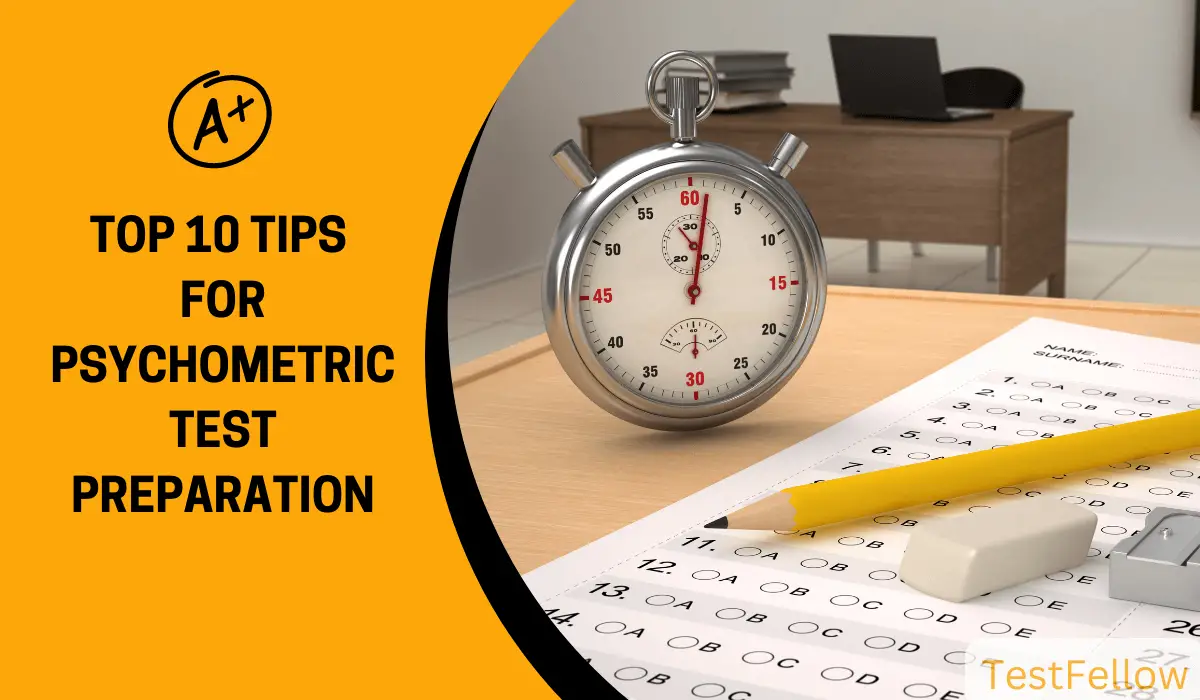Psychometric tests have become a common tool for assessing candidates during job recruitment and various educational contexts. These tests measure cognitive abilities, aptitude, personality traits, and more. To excel in a psychometric test, effective preparation is key. Here are 10 essential tips to help you navigate the challenges and achieve success:
1. Understand the Test Type:
Familiarizing yourself with the specific type of psychometric test you’ll be facing is the initial step. Whether it’s an aptitude test, a personality assessment, or a blend of both, comprehending the test’s format and content is essential. This understanding allows you to tailor your preparation more effectively, focusing on the areas that align with the test’s requirements.
2. Gather Relevant Materials:
If possible, gather a variety of resources related to psychometric tests. This could include sample test papers, practice questions, and study guides. These materials offer valuable insights into the types of questions and tasks you might encounter during the actual test. Familiarity with these resources equips you with an advantage, as you’ll be more attuned to the test’s patterns.
3. Time Management:
Many psychometric tests come with time constraints, making time management a crucial skill. Practicing under timed conditions helps you develop strategies for answering questions efficiently while maintaining accuracy. Enhancing your time management skills ensures that you’re able to complete all sections of the test within the allocated time, minimizing the risk of unanswered questions.
4. Brush Up on Basics:
A solid foundation in basic mathematical concepts, grammar rules, and logical reasoning is beneficial for many psychometric tests. Reviewing these fundamental elements ensures that you’re well-equipped to handle questions that may involve numerical calculations, language usage, and logical deductions.
5. Strengthen Cognitive Skills:
Cognitive skills like critical thinking, problem-solving, and decision-making play a pivotal role in psychometric tests. Engaging in activities that exercise these skills, such as solving puzzles, playing brain games, and practicing logical exercises, can significantly enhance your performance. These activities train your mind to think analytically and strategically, preparing you for the test’s challenges.
6. Practice Regularly:
Consistent practice is key to success in psychometric tests. Set aside dedicated time each day to solve practice questions. As you progress, you’ll become more attuned to the test’s patterns and formats. Regular practice not only boosts your confidence but also helps you identify areas where you may need additional preparation.
7. Simulate Test Conditions:
Replicate the actual test environment as closely as possible during practice sessions. Find a quiet place with minimal distractions and time yourself just as you would during the real test. Simulating the conditions helps you acclimate to the pressure and time constraints, ensuring that you’re well-prepared for the actual test day.
8. Analyze Mistakes:
After completing practice sessions, thoroughly review your answers, especially for questions you got wrong. Understand the reasons behind your mistakes and identify any recurring patterns. This analysis enables you to pinpoint areas where improvement is needed, allowing you to focus your efforts strategically.
9. Stay Calm:
The pressure of a psychometric test can be overwhelming, but maintaining a calm and composed demeanor is crucial. Employ relaxation techniques, such as deep breathing and mindfulness, to manage test anxiety and stress. A composed mind not only enhances your cognitive performance but also enables you to approach questions with a clear perspective.
10. Get a Good Night’s Sleep:
Prioritize adequate sleep the night before the test. A well-rested mind is more alert, focused, and capable of processing information efficiently. Sleep plays a significant role in cognitive function and memory consolidation, ensuring that you’re mentally prepared to tackle the challenges of the test day.
Expert Advice from TestFellow
As we wrap up, let’s remember the insights offered by TestFellow. These 10 important tips are your tools for tackling psychometric tests. With them, you’re ready to prepare and boost your chances of success. Just know that being prepared and practicing regularly are key to feeling confident and performing well on test day.
To further enhance your preparation, we recommend trying out our comprehensive practice tests, meticulously designed to simulate real test conditions and provide you with valuable insights. Trust in your preparation, and remember that TestFellow is by your side, ready to assist you in every step of your psychometric test preparation journey. Good luck!
Related Articles:
- How to Pass an Aptitude Test: Top 10 Effective Tips
- How to Prepare for Personality Tests: 10 Expert Tips
- Expert Tips for Taking Online Exams
- How to Answer Multiple Choice Questions: 10 Tips
- The Ultimate Guide to Online Test Preparation
- Tips to Pass an Analogies Test
- 12 Effective Test Preparation Tips for Students

